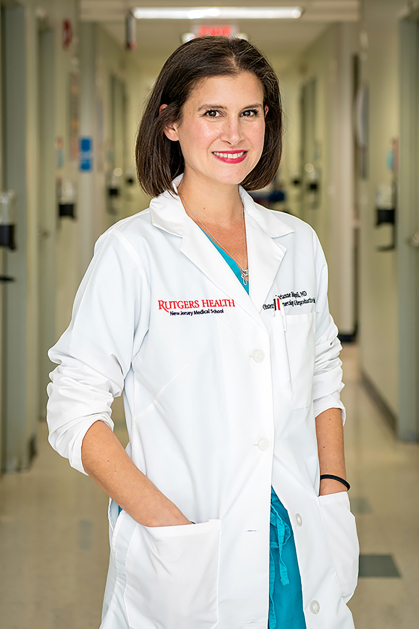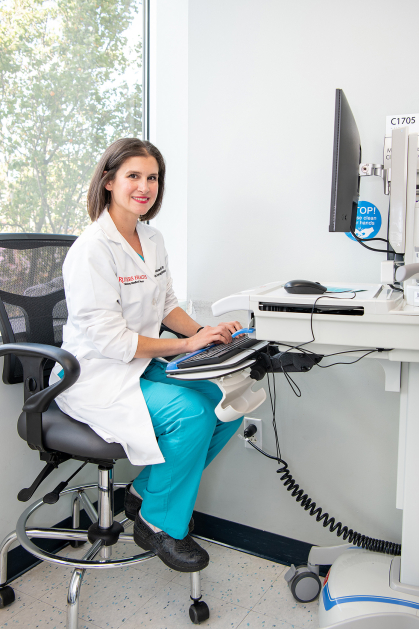Early Pregnancy Assessment Clinic Addresses Gap in Prenatal Care

A new clinic is addressing a critical gap in pregnancy care: the first trimester, when 80 percent of miscarriages occur. It often takes two months to secure a first obstetrics visit, so many patients turn to emergency rooms for concerns that could be safely triaged in outpatient settings offering more support. But Marianne DiNapoli, a doctor of obstetrics and gynecology at New Jersey Medical School, is now charting a better course.
In October 2023, she launched the Early Pregnancy Assessment Clinic (EPAC), held Monday afternoons at University Hospital's Ambulatory Care Center in Newark. It treats patients who have pregnancies with uncertain viability, such as bleeding, cramping and possible ectopic pregnancies, and those seeking care after pregnancy losses.
"The E.R. is a hard place to build rapport," she said. "In the ambulatory setting you have time to sit down and talk in a calm environment. It builds trust."
This "one-stop shop" avoids the traditional approach to care, which tends to be heavily siloed, and instead prioritizes the needs and preferences of the patient. The center provides services, including lab work and referrals for prenatal care and same-day treatment for miscarriages and nonviable pregnancies.
The clinic can also provide exams, ultrasounds, contraception and pregnancy planning and grief counseling. That's especially important, as 10-20% of people experience depression after a miscarriage, DiNapoli noted. The rate's "exceedingly high" and the mental health risks increase for patients of color, the same patients who are more likely to visit the ER for early pregnancy complications.
The EPAC's clinical model emphasizes protocols that can help negate implicit bias. "It potentially takes race out of the equation, treating all patients the same to eliminate health care disparities and miscarriage management," she said. "It's very important to me to help potentially marginalized patients access high-quality, evidence-based care."
This type of care has been common in the U.K. since the early 1990s but only gained traction here in the last five years. The University of Pennsylvania's PEACE (Pregnancy Early Access Center) clinic, for example, reports it saves patients $500 to $1,000 per case, while eliminating an average 3.5 hours of ER personnel time. It also decreases steps, allowing for swifter resolutions.

Originally from upstate New York, DiNapoli practiced in Ohio after her residency. NJMS offered her the opportunity to teach, while working with medically underserved patients without insurance and those with insufficient coverage. "I also wanted a place to further develop my career interest in family planning," she said. "It was a pretty ideal fit."
She joined the Department of Obstetrics, Gynecology and Reproductive Health in August 2023 as an assistant professor, and the clinic was launched two months later. Within weeks, the clinic had 17 patients scheduled for the half-day session, just from internal referrals. "This was before any marketing and I don't think it's even built into the call-center algorithm yet," she said.
None of this swift success surprised her colleagues, including Lauren Naliboff, assistant professor of obstetrics, gynecology and reproductive health. "Dr. DiNapoli is an excellent addition to the department and provides compassionate and innovative care," said Naliboff, an OB/GYN who is the director of Family Planning Services. "This clinic increases access and improves the quality of care for patients with concerns in early pregnancy."
Currently DiNapoli is the clinic's only attending physician. She has occasional help from a chief resident and medical students, plus usually one or two support staff, often a medical assistant or licensed practical nurse. Patients tend to wait maximum of six days to make an appointment, but DiNapoli hopes as the clinic's resources grow, patients would be able come in within two days. "Right now, it's a small team but hopefully one that will grow," DiNapoli said.
To make an appointment at the clinic, call 973-972-2700 and request EPAC. Patients can self-refer.






